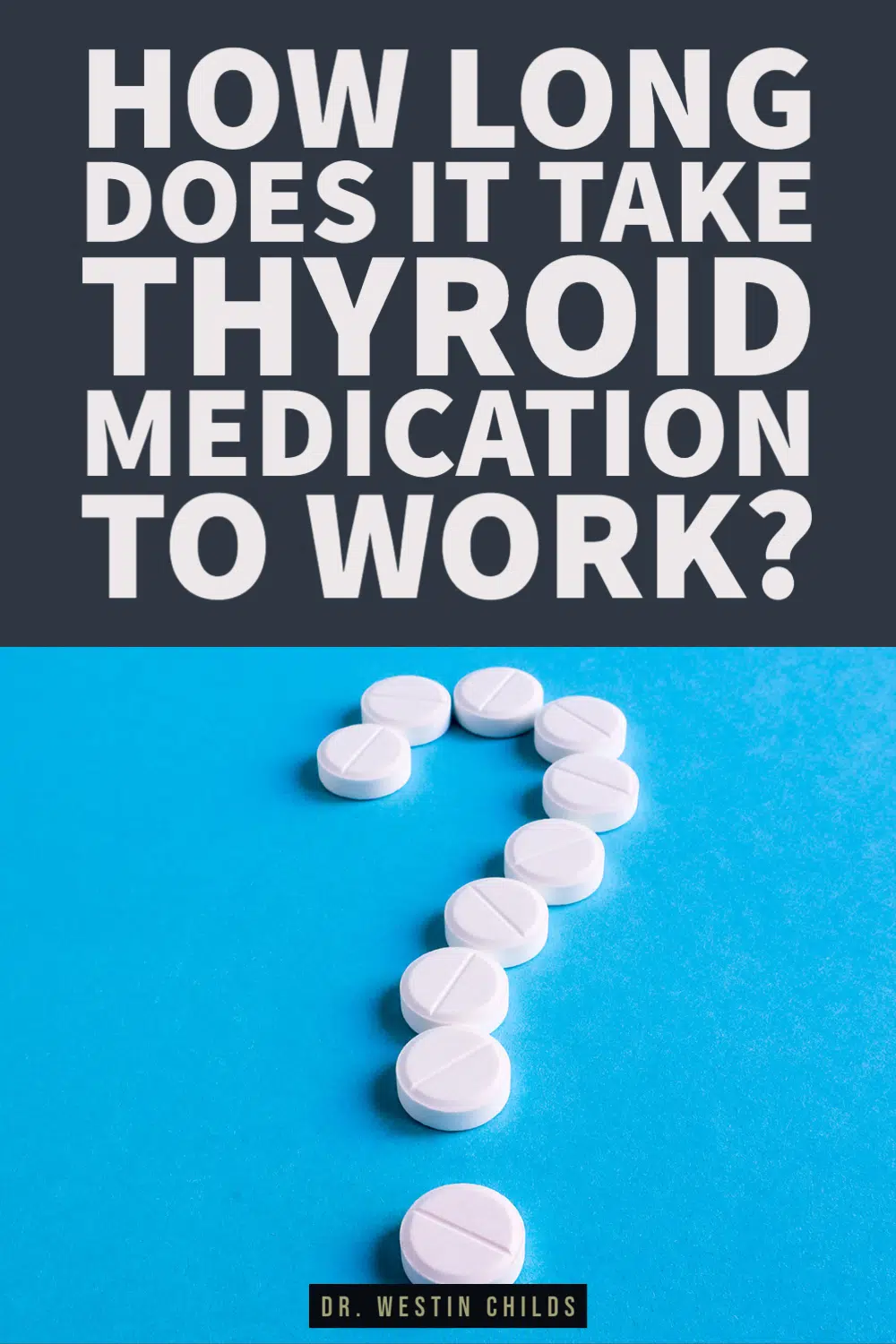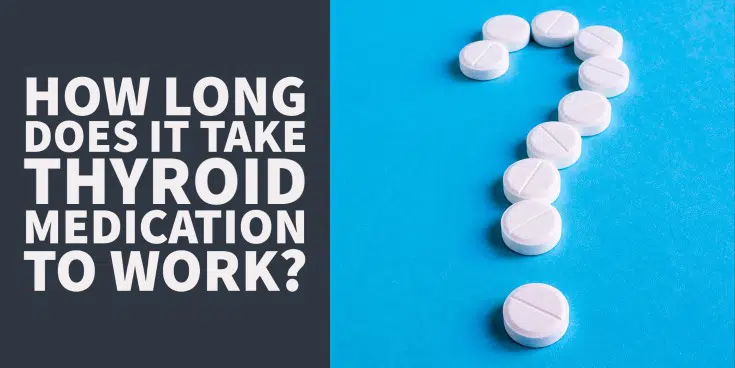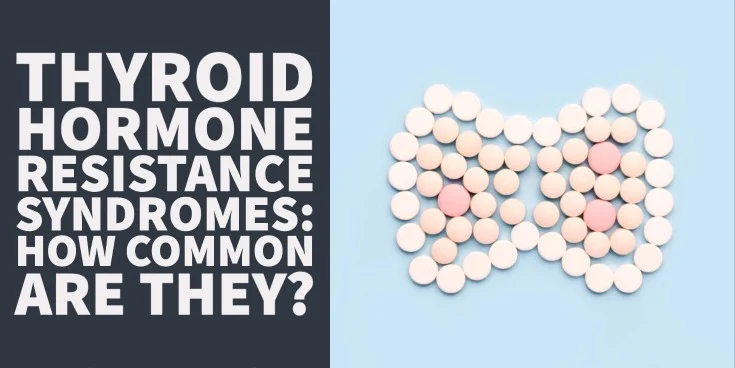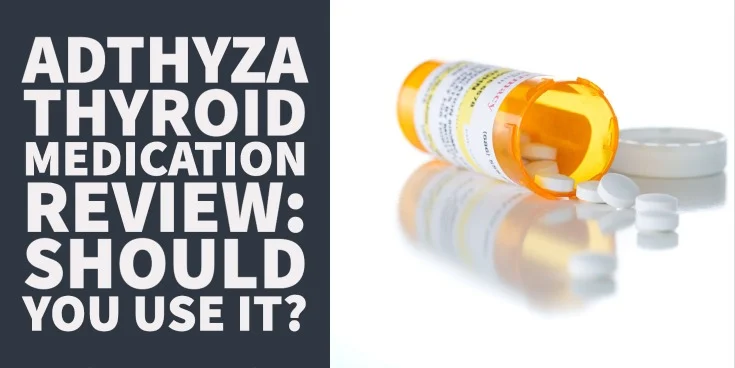Have you recently started taking thyroid medication?
Are you still waiting for it to kick in?
If so, then this is the article for you.
The short answer to your question is that it takes around 6 weeks for thyroid medication to kick in and for you to start feeling better.
The long answer is that it can be shorter than that or even longer depending on several factors.
Learn more about what factors influence how quickly you will feel better, what things can be sabotaging your medication from working, and how long it will take you to lose weight.
How Long Does it Take to Feel Better?
As I said before, if you are just starting thyroid medication then you should expect to wait about 6 weeks before you start noticing any difference.
Why does it take so long for thyroid medication to work?
Unlike other medications, thyroid medication acts as a hormone inside of your cells.
Thyroid hormone circulates through your body, enters into your cells, latches onto the nucleus, and directly changes your genes through genetic transcription (1).
As you can imagine, this process is not instant.
It takes time to take effect.
There is no immediate “on” switch like there is for other functions in your body and using thyroid medication just takes time.
Does that mean it takes 6 weeks for everyone?
Not at all.
In fact, some people notice an almost immediate difference when they take thyroid medication (even after the first pill).
Usually, this is an indication that they are severely deficient in thyroid hormone.
For those people with mild deficiency, however, it can take up to the full 6 weeks or anytime in between.
Finally, it’s not uncommon for it to take even longer than the cited 6 weeks as well.
Some people just respond slower than others to typical medications and doses and there isn’t anything you can do about it.
It’s also important to remember that other factors can influence how quickly you will feel better.
Things to consider when it comes to waiting for your thyroid medication include:
#1. Your starting dose
Generally, the higher your starting dose the quicker you will start to feel better.
That doesn’t mean you should jump to a high dose, however, as higher doses may cause symptoms of excess thyroid hormone.
#2. Are you taking T3?
Another important factor is whether or not you are using T3 thyroid medication.
People who take T3 thyroid medication will often feel better even sooner than those taking T4 medications like Synthroid or levothyroxine.
Why?
Because T3 is the most active thyroid hormone and it doesn’t require activation in order for it to work.
#3. Is your lifestyle healthy?
No amount of thyroid medication is going to make you feel better if your diet is not clean, if you are not sleeping at night if you don’t exercise, and if you are stressed out of your mind.
If you don’t take care of these things then you may continue to feel poorly while taking thyroid medication even if you are taking ‘enough’.
There are also plenty of other factors which influence the length of time it takes thyroid medication to kick in and some of these are within your control.
Whether you realize it or not, you may accidentally be sabotaging yourself by doing certain habits which influence how effective your thyroid medication dose can be.
DOWNLOAD FREE RESOURCES
Foods to Avoid if you Have Thyroid Problems:
I’ve found that these 10 foods cause the most problems for thyroid patients. Learn which foods you should avoid if you have thyroid disease of any type.
The Complete List of Thyroid Lab tests:
The list includes optimal ranges, normal ranges, and the complete list of tests you need to diagnose and manage thyroid disease correctly!
Reasons You May Not Be Feeling Better
What if you’ve waited for more than 6-8 weeks and you still aren’t feeling any better?
If this is you then don’t panic.
There are no fewer than 8 reasons you may not be feeling better that could potentially explain your persistent symptoms.
If you still remain symptomatic after taking your thyroid medication then make sure to read this list below.
But most of all, remember to be patient!
It can take a while to get your dose dialed in and the entire process can take months.
Don’t let this discourage you, however, because there is a high chance that you will get to where you need to be.
Just remember:
It’s not normal to feel poorly if you are still taking thyroid medication.
#1. You are taking your medication with food.
One simple thing to remember when you take thyroid medication is to never take it with food!
The only thyroid medication that you can take with food is Tirosint (2) (and even then it’s probably not recommended).
Typical thyroid medications such as levothyroxine and Synthroid absorption can be blocked if you take them with food.
This is why your doctor (and pharmacist) should have told you to take your medication on an empty stomach.
Whether or not you listened to them is a different story!

Taking your medication with food in your stomach may limit the amount of thyroid hormone your body can absorb (3).
So, even if you are taking the right medication, at the right time, and in the right dose, it’s still possible that it’s not getting into your body.
Make sure you take your medication on empty stomach and give yourself enough time before you eat.
Most people recommend no food 1-4 hours before or after you take your medication.
You can learn more about other tips and tricks when taking your thyroid medication in this post here.
#2. Your dose isn’t high enough.
Another common reason you may not be feeling better is that your dose is simply not high enough!
This actually happens a fair amount.
Why?
Because your doctor would much rather accidentally underdose you than overdose you.
Doctors do the same thing with other medications such as insulin for diabetics (4).
But, even if your doctor wants to get you on the right dose, the chances of him or her putting you on the exact amount that your body needs on the first try is very slim.
In the vast majority of thyroid patients, it takes at least 2-5 dose adjustments before you find what works well for your body.
And, because you shouldn’t check your thyroid labs sooner than 6 weeks, it can take several months for you to fine-tune your dose.
The good news is that you don’t have to get your dose to the perfect range for you to start feeling better, however.
Along the way, as you adjust your dose, you should notice small but incremental changes to your symptoms (in a positive way).
Don’t be afraid to ask your doctor to check your thyroid lab tests if you aren’t feeling back to 100%.
#3. You need a different type of thyroid medication.
Most patients with hypothyroidism are started on medication such as Levothyroxine or Synthroid.
But there are actually many more different types of thyroid medications available than just these.
Some medications get a bad reputation for unfair reasons, but that’s just the way it is.
The reality is that these medications have their place in the treatment of certain patients and it’s possible that you are one of them.
You can split thyroid medications into 3 main groups:
- T4-only thyroid medications
- T4 + T3 thyroid medications
- T3-only thyroid medications
If you aren’t feeling well on T4-only thyroid medication (which is what Synthroid and levothyroxine are) then you may want to at least trial the other medications in the list above.
These medications can sometimes be trickier to dose, but it’s absolutely worth it if it means that you feel better.
#4. You are taking your medication with coffee.
You may be taking your medication without food but are you taking it with your morning coffee?
Coffee is another factor that may be influencing your thyroid hormone absorption and one that you aren’t even considering!
Coffee has the effect of increasing the kinetic movement of your bowels.
Basically, coffee speeds up the movement of your bowels because of the caffeine content in it which is one of the reasons it can cause you to have a bowel movement.
This may be a desirable effect for you, but it doesn’t do any good for thyroid hormone absorption.
The faster your bowels move the shorter amount of time your medication has to be absorbed in the intestinal tract.
If you are taking your medication with coffee in the morning, you may want to think twice!
If you absolutely have to have your morning coffee then you may find more success switching to Tirosint which is still absorbed even while eating or drinking coffee (5).
#5. You aren’t waiting long enough.
This may not be what you want to hear but it may be the truth.
Sometimes it’s just a matter of time before your thyroid medication kicks in.
The average length of time it takes for most people to notice a difference is around 6 weeks.
But that is just the average.
Some people notice a difference almost immediately (after the first pill) while it may take others longer than the 6-week period of noticeable improvement.
How quickly (or slowly) it takes to work in your body will depend on how deficient you are, what other problems you are dealing with, and how much thyroid medication you are absorbing.
If you haven’t noticed a significant improvement after 6-8 weeks then don’t be afraid to go back to your doctor to get your labs re-tested and medication adjusted if necessary.
#6. Your thyroid isn’t your main problem.
Another potential explanation has to do with factors unrelated to your thyroid.
It’s actually possible (and common) for hypothyroid patients to also suffer from OTHER medical conditions.
And these problems can cause symptoms that mimic hypothyroidism.
Remember:
Some of the most common symptoms of hypothyroidism include hair loss, fatigue, and weight gain.
There are so many other conditions that can cause these exact same symptoms.
Conditions such as nutrient deficiencies, insulin resistance, leptin resistance, adrenal fatigue, and so on.
If you’re taking thyroid medication and your lab tests look good but you still remain symptomatic, then you may need to take a look at these other factors.
#7. You aren’t being consistent.
If you want your thyroid medication to work then you need to be consistent while taking it.
What do I mean?
I mean taking it at the same time each and every day.
By maintaining consistency in how you take your medication you will help even out absorption and bloodstream levels of the hormone.
If you are taking your medication at 6:00 am one morning and then 8:00 am the next morning or skipping a day here or there then that may explain your persistent symptoms.
Pick a time to take your medication and stick to it.
#8. Other medications are interfering with your medication.
Lastly, another factor worth considering has to do with other medications that you might be taking.
It’s not uncommon for other medications to interfere with thyroid medication.
Not all medications do this, but there are certain medications that tend to cause problems.
Medications that interfere with thyroid hormone include:
- Blood pressure medications (especially beta-blockers (6))
- Anti-seizure medications (7)
- Estrogens, birth control pills, and bio-identical hormones (8)
- Diabetic medications (such as Metformin (9))
If you are on any of these medications you may want to touch base with your Doctor to see if you can find another option.
Whatever you do, don’t stop taking your medication cold turkey without discussing it with your doctor!
In many cases, you may be able to switch to a different type or class of medication which can often help.
How Long After Starting Medication Will it Take to Lose Weight?
When should you expect to magically lose all of the weight you’ve gained from hypothyroidism?
Unfortunately, the answer is that most people do NOT lose weight after starting thyroid medication (especially T4-only thyroid medications).
If you are one of the lucky few people who will lose weight after starting your medication then it will most likely occur slowly and over a period of 3 to 6 months.
You will probably notice a small amount of weight loss on the scale but over time you should notice that your clothes fit better.
It’s important to note that this is not common.
Don’t let this get you down, however, because there are still definitely ways for you to lose weight if you have thyroid disease.
Why don’t most people lose weight?
It has to do with what medication you are using, your dose, your free thyroid hormone levels, and other hormones in your body.
Simply taking thyroid medication isn’t enough to solve all of these problems but it is a good step in the right direction.
When it comes to weight loss, most hypothyroid patients find success using medications that contain T3 (medications such as Armour thyroid and Cytomel).
This has to do with the fact that your free T3 levels (and total T3) tend to correlate with weight loss (10).
The higher your T3 levels the more weight you will lose.
Standard thyroid medications like levothyroxine do not contain T3 thyroid hormone and so people on these medications may still experience low T3 even though they are taking it.
Conclusion
If you are taking thyroid medication then you should allow a good 6 weeks from your start date before you start getting worried about whether it is working for you or not.
Thyroid medication tends to take time to work as it alters genetic transcription inside of your cells.
This waiting game can be frustrating, but it’s just how it goes.
There are also many other reasons which can limit how effective your thyroid medication can be.
If you have been taking your thyroid medication faithfully for 6 weeks or longer then you may want to look at these other factors.
Now I want to hear from you:
Are you taking thyroid medication right now?
Are you feeling better?
How long did it take for you to notice a difference? Are you still waiting?
Leave your questions or comments below!
Scientific References
#1. https://www.ncbi.nlm.nih.gov/pmc/articles/PMC329618/
#2. https://www.ncbi.nlm.nih.gov/pmc/articles/PMC4904100/
#3. https://www.ncbi.nlm.nih.gov/pmc/articles/PMC2758731/
#4. https://www.ncbi.nlm.nih.gov/pmc/articles/PMC4265808/
#5. https://www.ncbi.nlm.nih.gov/pubmed/22932947
#6. https://www.ncbi.nlm.nih.gov/pmc/articles/PMC1714646/
#7. https://www.ncbi.nlm.nih.gov/pubmed/28364656
#8. https://www.ncbi.nlm.nih.gov/pmc/articles/PMC3113168/
#9. https://www.ncbi.nlm.nih.gov/pmc/articles/PMC4310072/
#10. https://www.ncbi.nlm.nih.gov/pubmed/28138133








